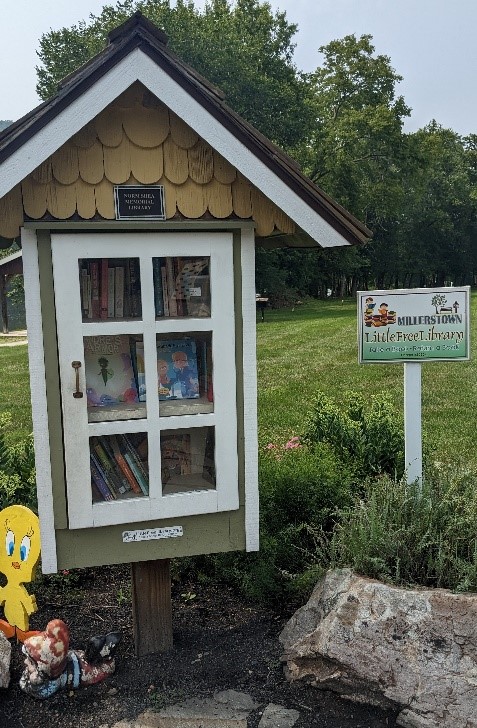Vaccine Education Program for Children Addresses Vaccine Hesitancy in South Central Pennsylvania
In South Central Pennsylvania, Emergency Services Health Federation (ESHF), an organization focused on emergency medical response, recently expanded their mission to enhance prevention and harm reduction.
Since 2022, they’ve worked with nine counties to help share vaccine education resources and foster vaccine equity through health literacy.
“We first started by trying to understand how to reach people in a safe, nonthreatening way. We have Little Free Libraries all over the county, and people can choose to take a book or not,” explained Brittney Fuhrman, a Public Health Specialist with EHSF.
Fuhrman and her team, supported by 500 volunteers from EHSF’s Medical Reserve Corp (MRC), created a plan to place children’s reading materials in Little Free Libraries across all counties serviced including books such as Andre’s Armor, Ava Antibody Explains, and Maxine’s Critters Get the Vaccine Jitters. These resources focused on presenting key vaccine and health education themes in a creative and engaging way to children. 
As residents continued to show interest by taking the books from the Little Free Libraries, the project quickly evolved due to high demand. Soon EHSF staff and volunteers began hosting library events for children and families in partnership with local libraries. The events featured a group reading of one of the three books, followed by a question-and-answer session and free play where children could perform a pretend medical exam on stuffed bears and color in an activity book.
These events had a dual effect: Children became more familiar with doctor visits and getting vaccines, and parents were more at ease and willing to discuss their concerns with EHSF staff.
By design, EHSF provided the opportunity for parents to ask questions in a comfortable space. “The emphasis is on fun for children, who are going to get to play with stuffed animals, not on the ‘let’s go get vaccinated’ message,” Furman said.
From there, the Vaccine Education Equity Project (the Equity Project) added after-school programs, health fairs, and a partnership with Lancaster General Health to continue engagement with both children and parents. As of October 2023, the Equity Project had already hosted 11 library events, 30 after-school and community project events, and 13 vaccine clinics.
Project Details
Challenges
Initially, libraries were reluctant to allow Equity Project story time in their spaces, likely to avoid sensitive topics and potential negative reactions from community members. “The librarians took the lead. If they said no, we didn’t push, because they knew their community the best,” Fuhrman said.
Eventually, a library in Cumberland County hosted a story time, creating confidence in the project among regional libraries. Even after the project was granted access to trusted spaces, many people didn’t feel comfortable directly discussing vaccines, especially COVID-19 vaccines. It was important to ensure that trust was maintained.
Strategies
- The Equity Project team started with a hands-off approach to discussing vaccines by placing books in the Little Free Libraries, then by providing vaccine education materials to interested parents.
- All education materials were reviewed by an education coordinator and tailored to the audience. Two sets of materials were created: one including COVID-19 information, and one only including general health and wellness information including vaccines.
- EHSF developed inclusive talking points to help ensure populations like the local Amish community felt included.
- Internal partners, notably the MRC volunteers, provided support by attending events and disseminating books to both local and Little Free Libraries and to librarians or other library coordinators. These individuals know their community best and how to frame and advertise events in a way that would be well received.
Outcomes
- Across all events, more than 428 books were shared with children, along with vaccine care packages containing plush toys, activities, and other materials to encourage conversations among children and parents.
- Increased awareness in the community around routine childhood and COVID-19 vaccinations as the program grew.
- Librarians continue to request story time events, and school officials have shown interest in annual events.
- Children are naturally curious, and the Equity Project continues to engage and familiarize them with the purpose of vaccines to stay healthy and the vaccination process, especially in communities with low vaccine uptake.
Key Takeaways
- Provide a comfortable atmosphere for children while fostering a trustworthy environment for parents to ask questions. ESHF gained parents’ trust and understanding by leading conversations about the importance of vaccinations for overall wellness and health.
- Share a relevant personal story during conversations with concerned parents. Explain how you came to your decision to vaccinate your child.
- Collaborate with trusted community members who are familiar with the local population to assist with outreach in their own community.
“It is important to relate to your audience. Using a shared experience can engage parents, and it is always helpful to take a personal approach,” Fuhrman said.
Vaccination Strategies Applied by Emergency Health Services Federation:
